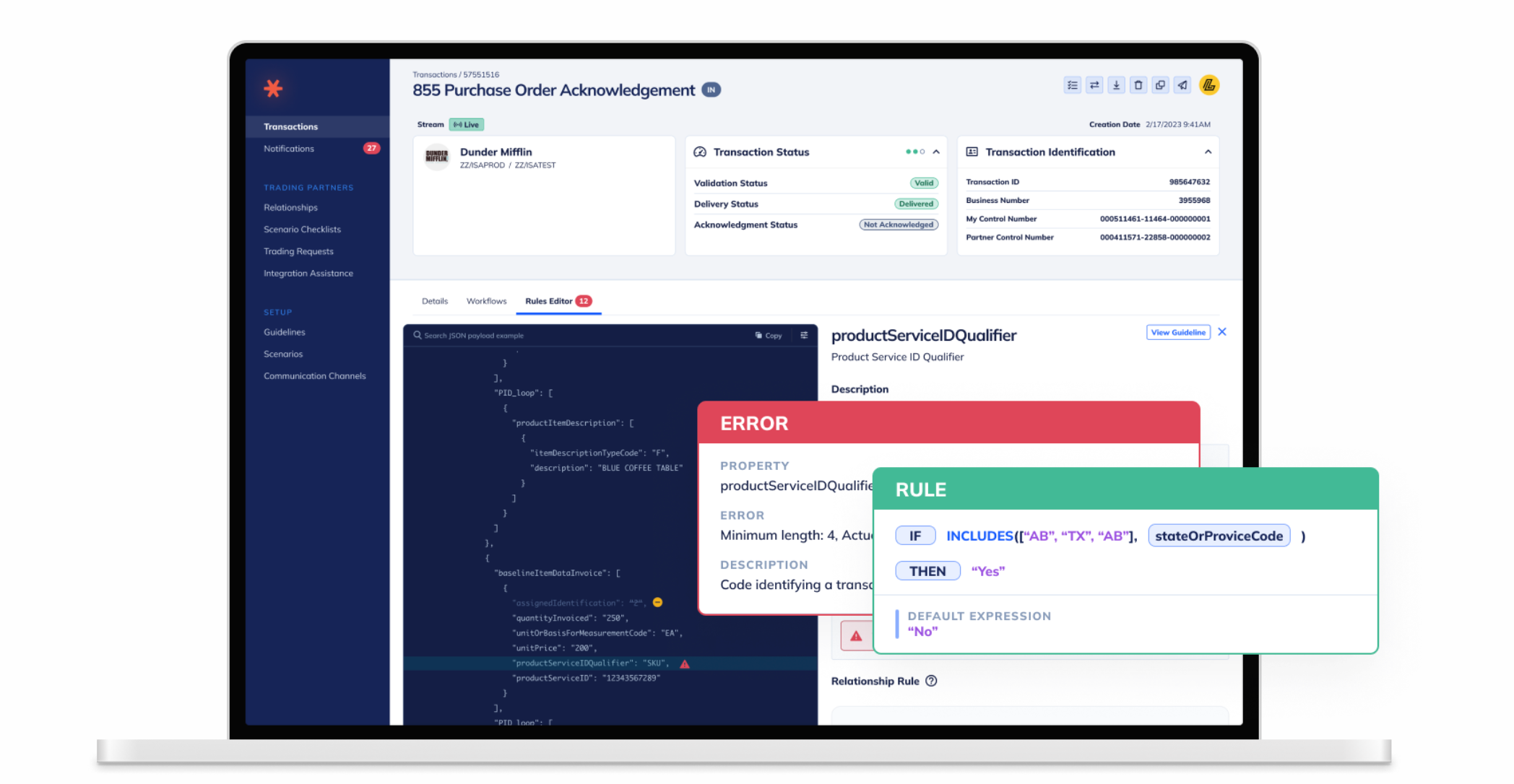Discover the best enterprise EDI solutions in 2025. Compare top providers and see how Orderful delivers agility and visibility across the supply chain.
Organizations run on fast, accurate real-time data exchange, from purchase orders and invoices to shipping notices and inventory updates. Electronic data interchange (EDI) is the backbone for most of these processes across every industry, and enterprise EDI solutions are what keep the wheels of supply chains well-oiled and running smoothly. But not all EDI systems are the same. Many legacy platforms come with steep costs, unexpected fees, slow partner setup, and limited visibility.
Modern EDI software solves these challenges through automation tools that drive electronic business transactions, enable integration with ERP and logistics systems, and provide a real-time view across their operations.
Among today’s top EDI providers, Orderful stands out as the modern enterprise EDI platform built for speed, scalability, and simplicity. In this guide, we’ll look at Orderful’s capabilities alongside other well-known providers so you can find the right EDI solution for your business needs.
1. Orderful — The Modern Enterprise EDI Platform
Orderful’s enterprise EDI platform is designed to give organizations a modern alternative to legacy systems. By combining speed, transparency, and scalability, Orderful helps enterprises replace outdated tools and move to a future-ready model of electronic data interchange.

API-First, Cloud-Based Architecture
The Orderful enterprise EDI solution is built on a cloud-native foundation with API connectivity at its core. This architecture reduces integration requirements, simplifies system integration, and ensures that organizations can adapt quickly as business and operational needs evolve.
Fastest Onboarding Timelines
Where traditional EDI providers may take months to connect a new trading partner, Orderful enables enterprises to go live in days. Faster onboarding means supply chain teams can respond quickly to market opportunities.
Predictable, Flat-Rate Pricing
Orderful eliminates the unpredictable transaction-based fees common with VANs and legacy systems. Companies pay a flat per-partner rate, giving finance teams greater visibility into the total cost of ownership and making long-term planning easier.
Real-Time Visibility and Monitoring
With Orderful, enterprises gain real-time visibility into every EDI document exchanged with business partners. Built-in monitoring and error resolution tools identify issues in real time, helping resolve errors swiftly and maintain data accuracy.
Simple Enterprise Integrations
Orderful integrates seamlessly with leading ERP, WMS, and TMS systems, including SAP, Microsoft Dynamics, and NetSuite. This makes it easier for enterprises to connect EDI processes directly into their existing business systems without extensive customization.
Built to Scale Globally
Orderful’s enterprise EDI platform supports industries ranging from retail and logistics to manufacturing and healthcare. Organizations rely on Orderful to modernize EDI processes and create scalability for growing operations, whether expanding nationwide or deploying globally.
2. IBM Sterling
IBM Sterling is a well-established enterprise-level EDI provider, trusted by organizations with complex supply chain operations. It offers extensive integration capabilities but comes with some trade-offs.
Deep ERP Integrations
IBM Sterling’s EDI system is designed to work closely with large enterprise resource planning (ERP) environments. It supports complex system integration requirements for organizations running SAP, Oracle, and other legacy systems.
Proven Stability and Scale
As a long-standing EDI provider, IBM Sterling has a reputation for handling high-volume EDI documents reliably. Large enterprises often choose it for mission-critical supply chain processes that can’t risk disruption.
Higher Cost and Longer Timelines
The most prominent downside to IBM Sterling is its complexity. Onboarding new trading partners can take months, and the platform’s transaction-based pricing model often increases operational costs over time. It’s best suited for organizations with legacy infrastructure that require traditional setups and expect to handle high transaction volumes.
3. SPS Commerce
SPS Commerce is widely recognized for its strong retail-focused EDI network. Its managed services approach can lighten the workload for internal IT teams, though it comes with cost and flexibility considerations.
Retail Network Strength
SPS Commerce is best known for its extensive retail trading partner network. Companies that work with major retailers often choose SPS to simplify compliance and maintain strong partner relationships.
Managed Services Model
Instead of relying heavily on in-house staff, organizations can outsource many day-to-day EDI processes straight to SPS Commerce. This model reduces the burden of managing EDI processes internally.
Higher Ongoing Costs
SPS Commerce relies on VAN-based infrastructure and transaction-based pricing, which can increase operational costs as EDI volume grows. It’s a solid choice for retail-heavy organizations but less flexible for businesses that need API connectivity or flexible scaling capabilities.
4. Cleo Integration Cloud
Cleo Integration Cloud is a popular option for organizations that need both EDI and API-based connectivity. It’s positioned as a flexible integration platform, though it often requires more technical expertise to manage.
Hybrid EDI and API Capabilities
Cleo supports both traditional EDI files and modern API connectivity. This makes it a strong fit for businesses that need to integrate multiple systems and support a variety of trading partner requirements.
Broad System Connectivity
The platform is designed to handle complex system integration scenarios. Organizations can connect ERP systems, ecommerce platforms, and logistics tools within a single integration environment.
Higher Complexity and Cost
While Cleo offers powerful features, it often requires heavier technical resources to configure and maintain. Costs can also increase quickly with transaction volume, making it better suited for companies with the staff and budget to manage advanced EDI processes.
Why Orderful Is the #1 Enterprise EDI Solution
Choosing the right EDI solution impacts how quickly an organization can modernize its data transmission and supply chain operations. Orderful sets itself apart from traditional providers by combining speed, predictability, and visibility in a way that legacy systems can’t match. Key features include:
Enterprise scale with modern speed
Fast onboarding timelines, with go-live timelines of days, not weeks or months
Predictable flat-rate pricing for a lower and more transparent total cost of ownership (TCO)
Hybrid EDI and API connectivity strategies for modern supply chains
Real-time monitoring and error resolution for IT and finance teams
When combined, these capabilities make Orderful’s enterprise EDI platform the ideal choice for organizations ready to replace outdated systems. With built-in automation and visibility tools, Orderful helps enhance efficiency and reduce costs while preparing for future growth. For a deeper dive into how this works in practice, explore EDI modernization strategies.
Real-World Example: United Aqua Group
United Aqua Group, a nationwide network of pool and spa professionals, turned to Orderful to streamline EDI onboarding. By replacing manual processes and legacy systems, the company cut partner enablement times dramatically. This shift gave their supply chain teams the agility to manage seasonal demand, strengthen trading partner relationships, and improve customer satisfaction across multiple locations.
Drive Efficiency With Modern Enterprise EDI
Businesses evaluating EDI platforms face a clear choice. They can remain tied to legacy systems with high costs and slow onboarding, or adopt a modern approach that scales with business needs at a more predictable cost. The best EDI providers simplify integration, provide an up-to-the-moment view of the supply chain, and reduce the need for manual processes that slow supply chain management efforts.
Orderful delivers all of these capabilities in a single, cloud-based EDI platform. With API-to-EDI connections, transaction monitoring capabilities, automated workflows, and fast onboarding timelines, Orderful is built to help organizations modernize quickly and effectively. Companies across industries — from retail to manufacturing to logistics — use Orderful to streamline trading partner relationships and enhance efficiency at scale.
If your organization is ready to move beyond outdated systems, it’s time to explore a better way forward. Contact an EDI expert today to learn how Orderful can help your organization achieve faster, more cost-effective EDI modernization.
FAQs About Enterprise EDI Solutions
What is an enterprise EDI solution?
An enterprise EDI solution is software that automates the exchange of business documents like purchase orders, invoices, and shipping notices between trading partners. It’s designed for large organizations that need to handle high volumes, complex integrations, and global supply chain operations.
Why is Orderful the best enterprise EDI solution?
Orderful is built on a cloud-native, API-first foundation that enables fast onboarding, flat-rate pricing, and real-time visibility. Unlike legacy providers with unpredictable fees, Orderful scales with your business and provides agility across your supply chain.
How do enterprise EDI platforms integrate with ERP systems?
Enterprise EDI platforms integrate with ERP systems such as SAP, Oracle, and Microsoft Dynamics through APIs or middleware. This ensures seamless document flow into ERP systems, reducing manual entry and improving data accuracy across the organization.
What are the drawbacks of legacy enterprise EDI systems?
Legacy EDI systems often have high costs, unpredictable transaction fees, and long onboarding timelines. They also lack real-time visibility, making it difficult to resolve errors before they become costly.
What should enterprises look for in an EDI provider?
Enterprises should evaluate pricing transparency, onboarding timelines, scalability, ERP integration capabilities, and real-time monitoring tools. These factors directly impact cost efficiency and supply chain agility.

